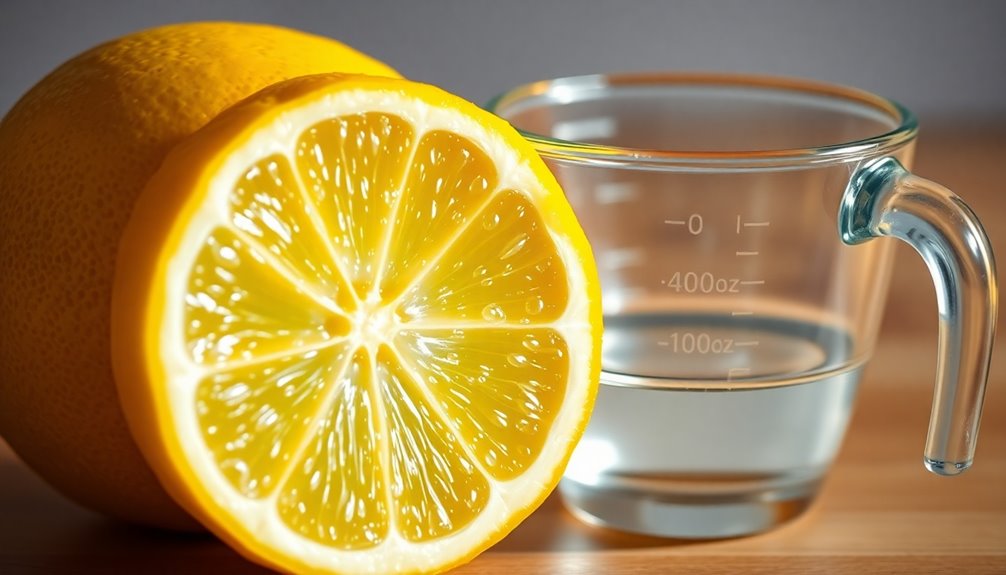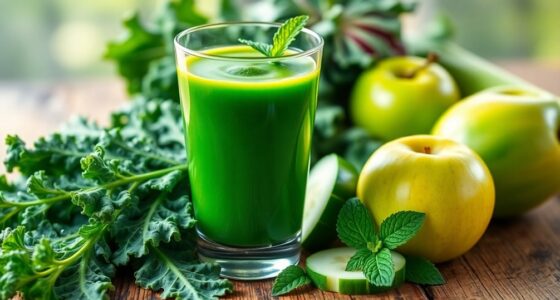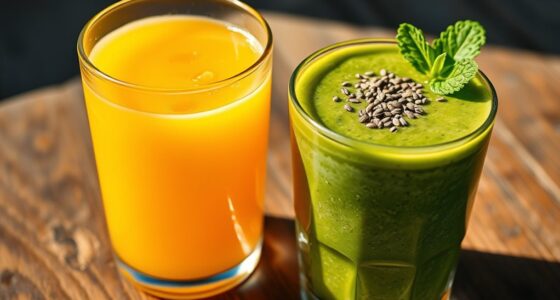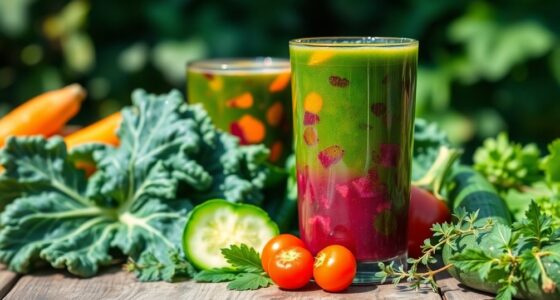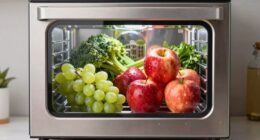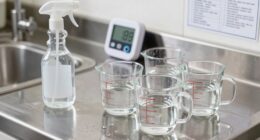When you squeeze a lemon, the amount of juice you get varies by size and type. Small lemons yield about 1 to 1.5 ounces, while medium ones can give you up to 2 ounces. Large lemons might provide around 2.5 ounces, and jumbo lemons can produce 3 ounces or more. Meyer lemons are usually sweeter and juicier. If you want to learn tricks to maximize your lemon juice extraction, there's more to explore.
Key Takeaways
- Small lemons yield about 1 to 1.5 fluid ounces of juice, roughly 2 to 3 tablespoons.
- Medium lemons provide approximately 1.5 to 2 fluid ounces, or 3 to 4 tablespoons of juice.
- Large lemons yield about 2 to 2.5 fluid ounces, equating to 4 to 5 tablespoons.
- Jumbo lemons produce around 2.5 to 3 fluid ounces, which is about 5 to 6 tablespoons of juice.
- Meyer lemons are sweeter and juicier than other varieties, enhancing overall juice yield.
Understanding Lemon Sizes and Juice Yields
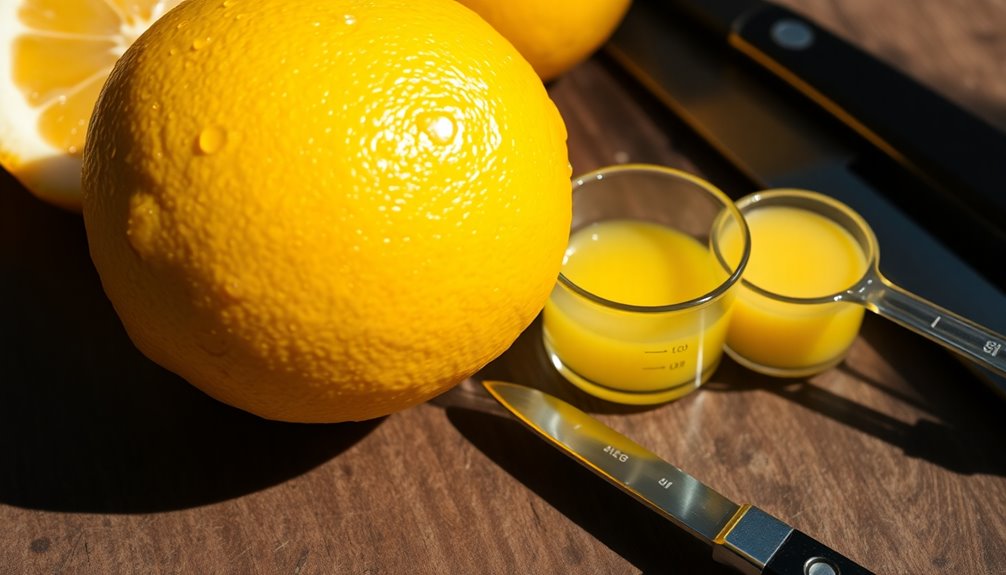
When you consider how much juice you can get from a lemon, it's essential to understand that lemon sizes can significantly influence yields. Larger lemons often contain more juice than smaller ones, but this isn't the only factor at play. The variety of the lemon also matters; for instance, a Meyer lemon may yield differently than a Eureka. Additionally, the ripeness of the lemon affects how much juice you can extract; ripe lemons are softer and easier to squeeze. Don't forget about rind thickness and juice sac structure, which can hinder or help juice release. Ponderosa lemons can yield up to two cups of juice, showcasing the impact of lemon variety on overall yield.
Juice Volume by Lemon Size
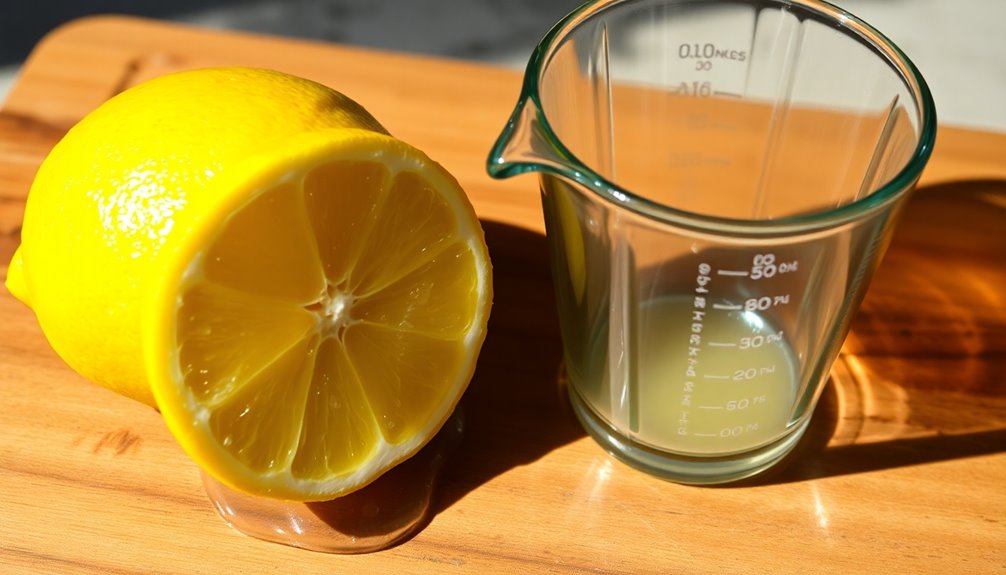
Lemon size plays a significant role in determining how much juice you can extract. Small lemons yield about 2 to 3 tablespoons, translating to 1 to 1.5 fluid ounces. They're perfect for recipes needing minimal lemon juice.
Medium lemons, weighing around 4 to 5 ounces, provide approximately 3 to 4 tablespoons, or 1.5 to 2 fluid ounces, making them versatile for most recipes.
Large lemons step it up, yielding about 4 to 5 tablespoons, equating to 2 to 2. 5 fluid ounces, ideal for dishes requiring more juice. Always buy extra lemons to ensure you have sufficient juice on hand. In addition to lemons, limes are another citrus fruit that can enhance your recipes. A typical lime has a smaller juice yield, averaging around 1 to 2 tablespoons, which is important to consider when planning your dishes. When cooking with citrus, it’s essential to note the lime juice yield measurement, as it can vary significantly, impacting the flavor balance in your meal. Always keep a variety of citrus fruits handy to maximize the freshness in your cooking.
Finally, jumbo lemons offer the most, producing 5 to 6 tablespoons, or 2.5 to 3 fluid ounces, perfect for large-scale cooking. Choose wisely based on your juicing needs!
Factors That Influence Juice Yield
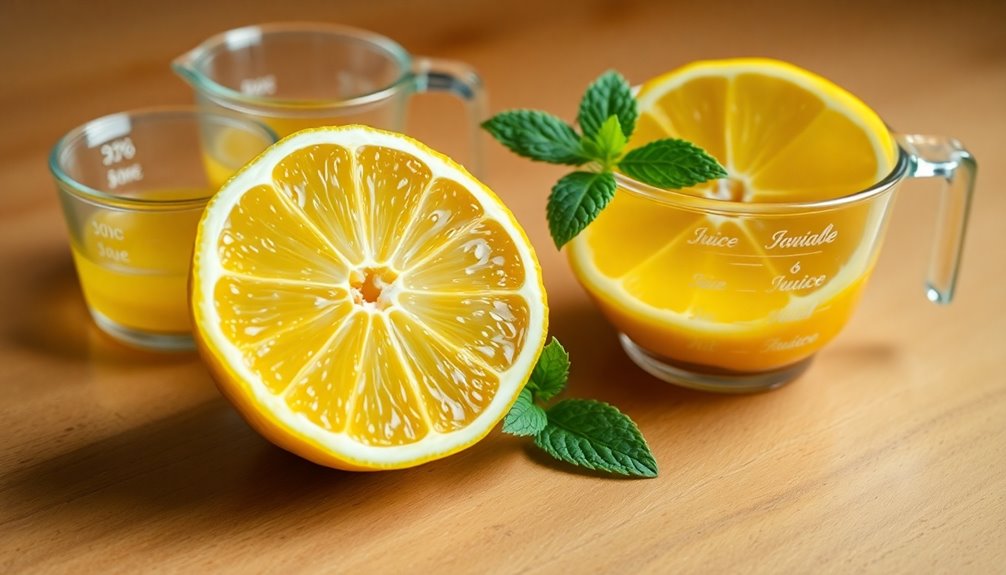
Several factors influence how much juice you can extract from a lemon, and understanding these can significantly enhance your juicing experience.
First, the variety of lemon matters; Meyer lemons are juicier and sweeter, while Eureka and Lisbon lemons are less juicy but more acidic. Additionally, size of lemon plays a vital role, as larger lemons typically yield more juice than smaller ones.
Ripeness plays a crucial role too—ripe lemons yield more juice, so look for ones that feel slightly soft and bright yellow.
Also, consider growing conditions; lemons thrive in humid climates with rich soil, producing juicier fruit.
Finally, how you store and handle your lemons affects their quality. Refrigerating them preserves moisture, while gentle handling prevents bruising.
Techniques for Maximizing Juice Extraction
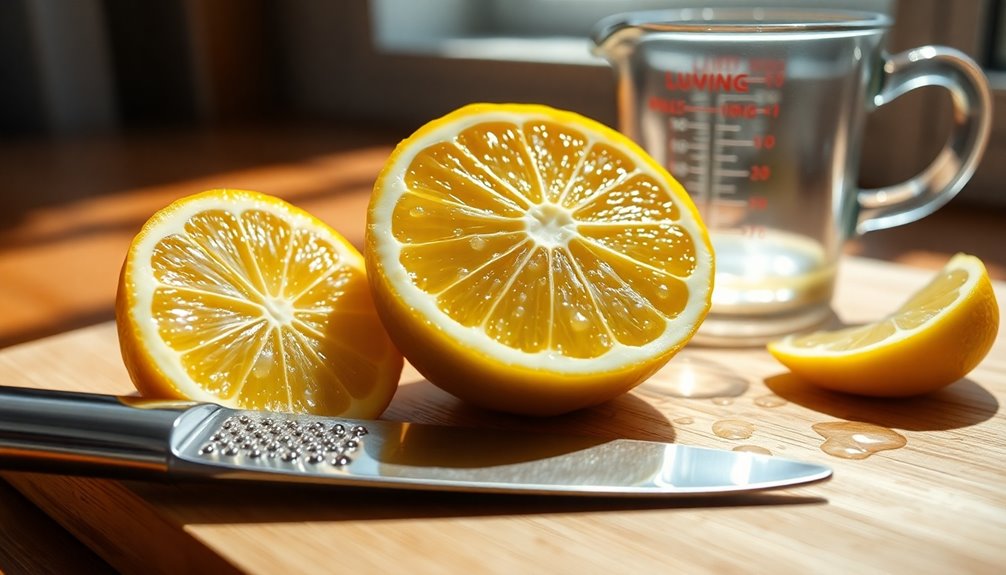
To maximize juice extraction from lemons, you can employ a variety of effective techniques.
Start by zesting the lemons before juicing, as this makes them easier to squeeze. If you microwave them for 10-25 seconds or soak them in hot water for a couple of minutes, the membranes loosen up, enhancing juice flow. Additionally, the average yield from one lemon is about 2-3 tablespoons of juice, which can vary based on the lemon's size and freshness.
Rolling the lemons on a countertop helps break down internal structures, while cutting them lengthwise exposes more juice sacs. Use room temperature lemons for the best yield.
For tools, consider electric juicers for large quantities or manual juicers for smaller amounts. A fork or spoon can also extract juice effectively.
Finally, remember that gentle pressure while juicing can make a significant difference in the amount you get.
Lemon Juice in Culinary Applications
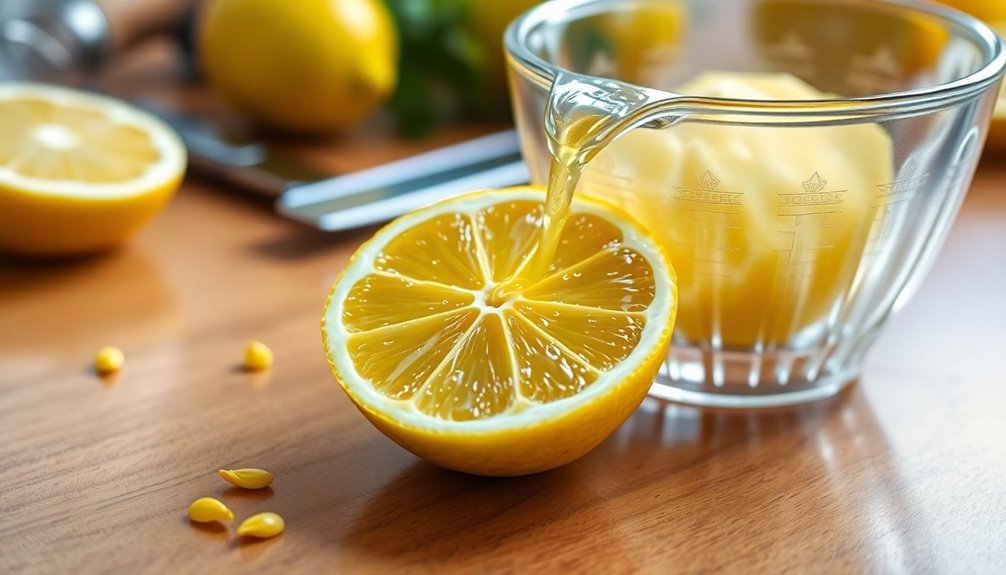
Culinary applications of lemon juice offer countless ways to enhance flavors and elevate dishes. Its zesty, sour profile brightens everything from salad dressings to marinades, adding balance and depth.
When you whip up a sauce or soup, lemon juice can elevate the taste, especially in seafood preparations. In baking, it acts as a leavening agent, ensuring your cakes and pastries rise beautifully while adding a fresh flavor that complements sweetness. Additionally, its health benefits include providing a good source of vitamin C, which supports the immune system.
You can also use lemon juice to prevent oxidation in fruits and vegetables or substitute it for vinegar in dressings. Its versatility makes it an essential ingredient, whether you're tenderizing meats or creating refreshing cocktails, like a Whiskey Sour or Lemon Drop Martini.
Waste and Yield Percentages Explained
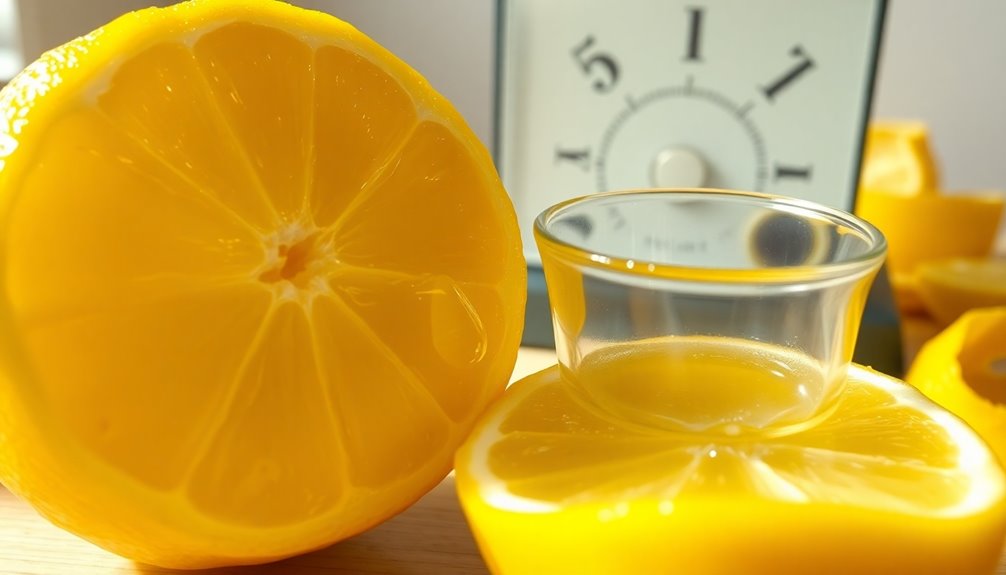
While understanding waste and yield percentages in lemon juice production may seem complex, it's crucial for maximizing efficiency in your cooking. Lemons typically have a yield percentage of about 45%, meaning that nearly half of their weight is usable juice. The size of the lemon plays a significant role; small lemons yield around 2-3 tablespoons, while large ones can provide up to 5 tablespoons. Additionally, the juice content of lemons can vary, with some lemons yielding more juice than others based on their ripeness and size.
To boost your yield, try microwaving or rolling lemons before juicing. Remember, older lemons often yield more juice, so use them before they spoil. Don't forget to zest the lemons first, as it enhances flavors and reduces waste. By grasping these concepts, you can make the most of your lemons in every recipe.
Economic and Sustainability Considerations
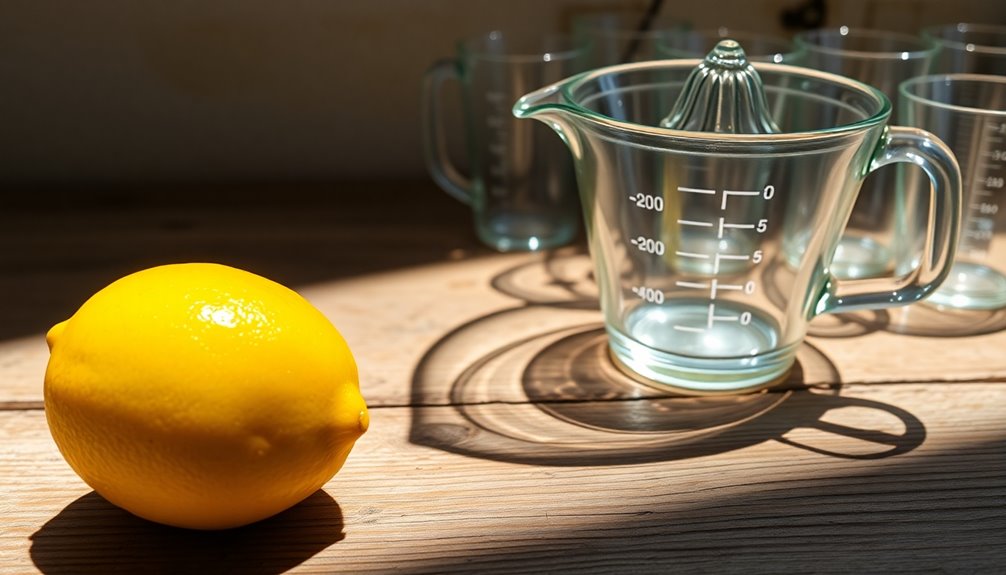
Understanding the economics and sustainability of lemon juice production helps you appreciate the broader context of your culinary choices.
The lemon juice concentrate market is growing, projected to reach USD 5.15 billion by 2031. However, production relies heavily on fresh lemon availability, which can fluctuate due to weather events and diseases. Additionally, the market is expected to experience a CAGR of 3.90% from 2024 to 2031, indicating a steady demand for lemon juice products.
Rising production costs, driven by inflation, challenge profitability in the industry. Competition from synthetic flavorings and other citrus juices also impacts pricing.
Sustainability faces hurdles like effective resource management and disease control, essential for maintaining supply chains.
As you consider your lemon juice options, remember the socio-economic factors, including job creation and income opportunities, especially in key producing regions like California and Argentina.
Proper Storage for Freshness and Longevity
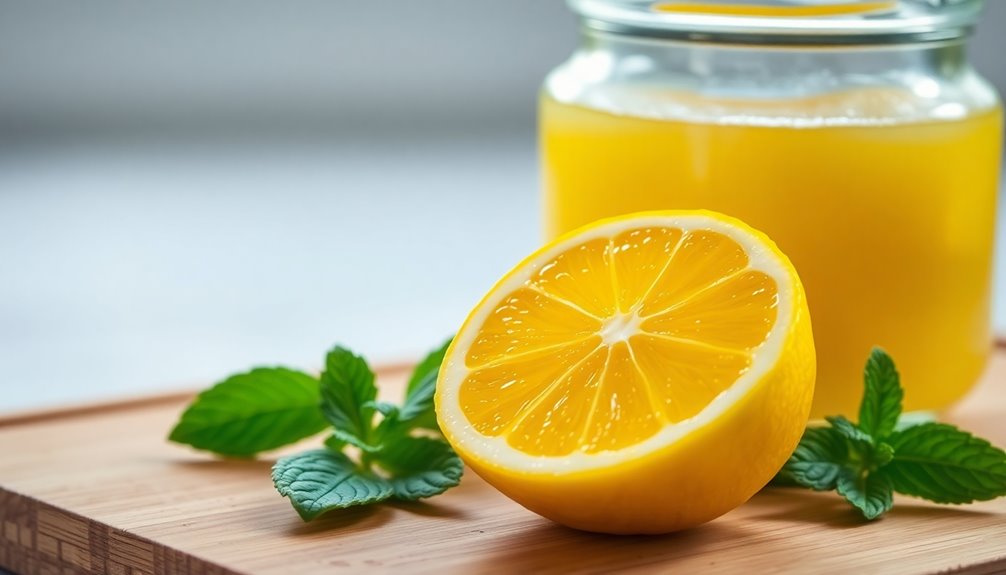
To keep your lemons fresh and flavorful, proper storage is essential. Store them at room temperature for up to two weeks, away from sunlight and ethylene-producing fruits. If you want to extend their shelf life, refrigerate them for about two weeks or place them in a sealed bag in the crisper, which can keep them fresh for three weeks to a month. Aim for temperatures between 50°F and 54°F with high humidity (90-95%) to prevent moisture loss. Additionally, freeze lemons for long-term preservation by storing whole lemons, slices, or juice in airtight containers for up to four months. Handle lemons gently to avoid bruising, and consider cooling them soon after harvest to slow down degradation.
Comparing Lemon Juice With Other Citrus
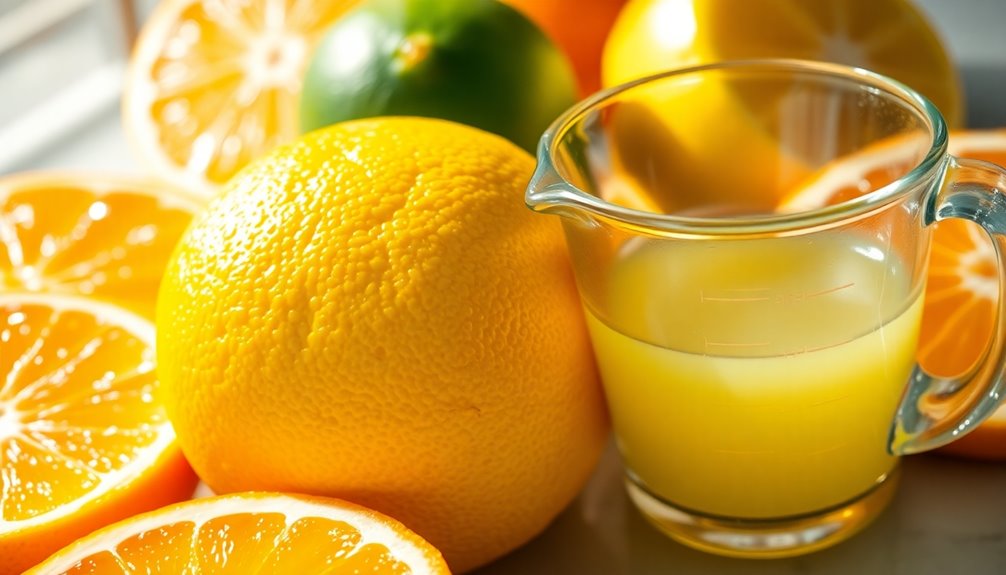
When you compare lemon juice with other citrus options, you’ll notice significant differences in yield and flavor profiles. Lemons typically produce about 2 to 5 tablespoons of juice, depending on their size, while limes yield only 1 to 2 tablespoons. Oranges and grapefruits stand out with their higher yields—around 4 to 8 ounces per fruit. This difference influences how you use them in recipes. For instance, while lemons add a bright acidity, oranges offer sweetness and juiciness. The flavor and juice content can vary based on ripeness and variety, like how Meyer lemons are juicier than standard lemons. In fact, a ripe lemon generally yields more juice than an unripe one. Additionally, understanding how much juice in a lemon can greatly enhance your cooking and baking endeavors, ensuring you achieve the perfect balance of flavors. When you’re following a recipe, it’s essential to account for the juice yield of the lemons you’re using, as this can vary significantly from one fruit to another. By knowing the typical yield, you can adjust your recipe for acidity and flavor accordingly, leading to consistently delicious results.
Creative Uses for Lemon Peels and Zest
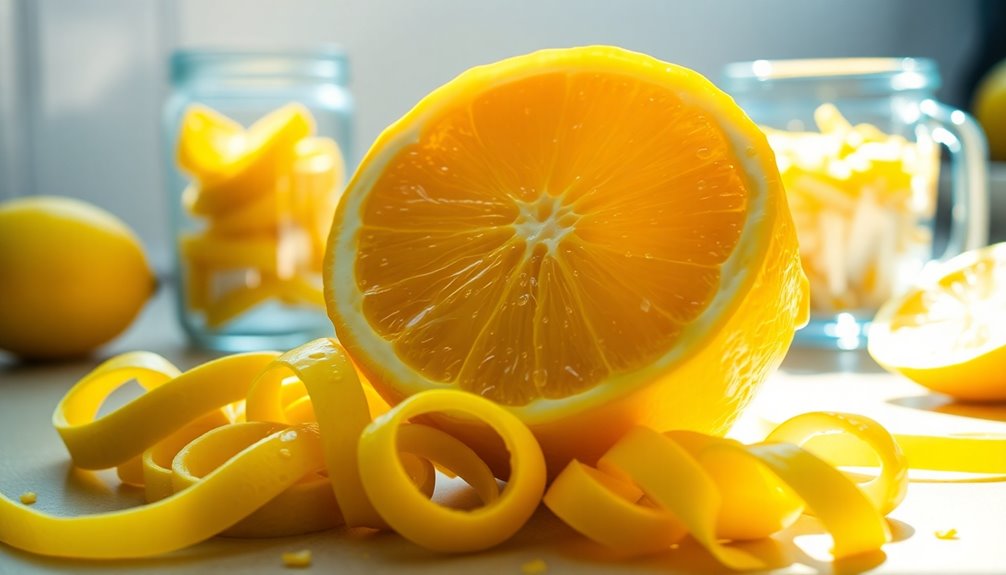
Lemon peels and zest are often overlooked, but they pack a punch in both flavor and utility.
You can dry lemon peels to create natural air fresheners or potpourri that brighten your home. Dehydrating lemon peels helps to extend their shelf life while retaining their refreshing scent. If you're in the mood for a sweet treat, candy the peels for a delightful snack.
For cleaning, use the antibacterial properties of lemon peels in your homemade cleaners or as scrubbers for metal utensils.
Zest adds a vibrant citrus flavor to baked goods, desserts, and salad dressings, enhancing your dishes. Don't forget that you can freeze lemon zest for later use.
With these creative applications, you're sure to get the most out of your lemons!
Frequently Asked Questions
Can I Use Bottled Lemon Juice Instead of Fresh Juice?
Yes, you can use bottled lemon juice instead of fresh juice, but there are some nuances to consider.
Bottled juice often contains preservatives, which can alter the flavor and acidity. While it's convenient and consistent for recipes requiring precise acidity, fresh lemon juice usually offers a brighter, more vibrant taste.
If you choose bottled, taste your dish and adjust as needed, ensuring it meets your flavor preferences.
How Do I Know if a Lemon Is Ripe?
You'd think picking a ripe lemon is a piece of cake, but it's more like a citrus guessing game!
To know if a lemon's ripe, look for a bright yellow color and glossy skin. Give it a gentle squeeze; it should feel firm yet yield slightly. Smell it—ripe lemons have a strong, zesty aroma.
Finally, check for weight; a ripe lemon feels heavy for its size, promising plenty of juice!
What Are the Health Benefits of Lemon Juice?
Lemon juice offers numerous health benefits you'll love!
It's packed with vitamin C, boosting your immune system and acting as an antioxidant. The citric acid aids digestion and may help prevent kidney stones.
Plus, it's low in calories, making it a refreshing addition to your diet. Regular consumption can support skin health and improve collagen production.
How Can I Tell if Lemon Juice Has Gone Bad?
To tell if your lemon juice has gone bad, check for color changes or cloudiness.
If it smells off or sour, it's likely spoiled. Taste it; if it's excessively sour or bitter, don't use it.
Look for visible mold or unusual particles, and notice if the texture has thickened or separated.
Always check expiration dates, and if you notice any signs of spoilage, it's best to discard it to avoid health risks.
Can I Juice Lemons With a Blender?
Yes, you can juice lemons with a blender! Just cut the lemons into smaller pieces, blend them with a little water, and strain the mixture if you want a smoother juice.
Keep in mind that blending retains more fiber, making the juice thicker and pulpier than traditional juicing. This method may take a bit more effort, but it's a great way to enjoy the full flavor and nutrients of the lemon!
Conclusion
So, next time you slice into a bright, zesty lemon, envision the vibrant juice bursting forth, ready to elevate your dish. Whether you're squeezing it into a refreshing drink or zesting the peel for a fragrant kick, you're tapping into nature's little treasure. By understanding lemon yields and maximizing extraction techniques, you'll savor every drop. Let the tangy essence of lemon brighten your culinary creations and inspire your kitchen adventures. Dive in and enjoy the citrus magic!
Cindy thoroughly researches juicing trends, techniques, and recipes to provide readers with practical advice and inspiration. Her writing style is accessible, engaging, and designed to make complex concepts easy to understand. Cindy’s dedication to promoting the advantages of juicing shines through her work, empowering readers to make positive changes in their lives through the simple act of juicing.

